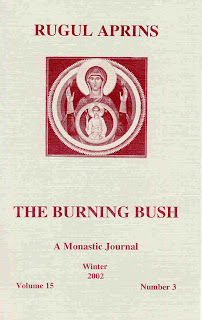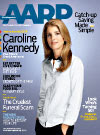>I rarely read the paper in the morning. I usually just take my coffee straight into the day’s activities… writing, painting, or household stuff. But this morning I had my coffee in bed with two servings of wisdom, from very dissimilar sources.
 First, the wisdom of Archimandrite Sofian Boghiu† (2002) … a Romanian priest-monk who spent some time at Holy Dormition of the Mother of God (Orthodox) Monastery in Rives Junction, Michigan before his death in 2002. Father Sofian was Abbot of Antim Monastery, Bucharest. Holy Dormition (the monastery I have been visiting since 1994) reprinted an article by Fr. Sofian in their winter monastic journal, The Burning Bush, which I received in the mail this week.
First, the wisdom of Archimandrite Sofian Boghiu† (2002) … a Romanian priest-monk who spent some time at Holy Dormition of the Mother of God (Orthodox) Monastery in Rives Junction, Michigan before his death in 2002. Father Sofian was Abbot of Antim Monastery, Bucharest. Holy Dormition (the monastery I have been visiting since 1994) reprinted an article by Fr. Sofian in their winter monastic journal, The Burning Bush, which I received in the mail this week.
The ar ticle was about spiritual discipline in general and the practice of fasting, in particular. Fr. Sofian says that our ascetic efforts must be “guided by inner temperance… with delight and willingness, not with hatred; it must be a joy.” He talks about how important it is during a fast (and always) to forgive one another. He talks about this forgiveness and its resulting peace:
ticle was about spiritual discipline in general and the practice of fasting, in particular. Fr. Sofian says that our ascetic efforts must be “guided by inner temperance… with delight and willingness, not with hatred; it must be a joy.” He talks about how important it is during a fast (and always) to forgive one another. He talks about this forgiveness and its resulting peace:
Any effort for enlightenment and salvation requires this inner peace. Because forgiveness means you own peace. And we cannot pray with anger. When you are tormented that someone wronged you, you have no peace in your heart and you cannot pray. This is dust that hurts and burns, wipe it off your soul so you can come to prayer with an open heart and return home with peace in your heart. Do not wait for the other person to ask forgiveness of you. Start by asking forgiveness yourself because it is impossible, no matter how guilty the other person maybe, that you did not have some fault, no matter how small… it is impossible.
Who doesn’t want to own peace? And not just at Christmas time.
So, as I finished reading the article, I thought about the things that can rob me of peace. Anger. Jealousy. Greed. Withholding forgiveness.
With my second cup of coffee I read an article by David Dudley in AARP The Magazine, called “Woulda, Coulda, Shoulda: The New Midlife Crisis: Coming to Terms with the Road Not Taken.” It’s about regrets.
First of all, I thought it was fitting that Caroline Kennedy’s picture was on the cover. She’s turned 50 in November. (A brief aside – at her 50th birthday celebration, Neil Diamond let Caroline know that she had been the inspiration for his hit song, “Sweet Caroline,” back when she was a small girl. He saw her on the news, an innocent sweet young girl, whose life was changed forever by her father’s assassination.) The point is, here she is on the cover of AARP The Magazine, looking beautiful, and peaceful. She’s one of ten individuals selected by AARP for their 2008 Inspire Awards… for making the world a better place. Caroline says:
Knowing the impact my parents had, and have, has always given me a continuing sense of their presence, as well as an understanding of the power every individual has to make a difference.
Maybe we don’t all have the same amount of power, but we do have the same ability to let go of unhealthy feelings that steal our peace. And most of us haven’t lost our fathers to an assassin’s bullet when we were children.
Back to the article. It’s about regret. Something that often overwhelms me. My best friend and my daughter have both told me (more than once) that I need to let go of my feelings of failure. Of a crippling kind of regret for things I wish I had done differently. Or better. Or not at all. The things that I’ve asked forgiveness for. So I’ve tended to think of regret as something bad. But maybe it can also be healthy, according to this article.
“Make the most of your regrets,” Henry David Thoreau counseled. “To regret deeply is to live afresh.” All well and good, but how? A life without regrets isn’t a realistic answer for most of us—after all, the hard-earned lessons of our sins and slip-ups make us who we are. “Maybe all we can do,” as playwright Arthur Miller wrote, “is hope to end up with the right regrets.”
Dealing with regret isn’t anything new, but it’s getting more attention because of the huge number of aging boomers “entering their regretting years.”
 Hamilton Beasley, Ph.D., a scholar-in-residence at St. Edwards University in Austin, Texas, and the author of No Regrets: A Ten-Step Program for Living in the Present and Leaving the Past Behind says:
Hamilton Beasley, Ph.D., a scholar-in-residence at St. Edwards University in Austin, Texas, and the author of No Regrets: A Ten-Step Program for Living in the Present and Leaving the Past Behind says:
One of the primary psychological tasks of people between the ages of 40 and 65 is to go through a period of re-evaluation and introspection regarding their lives. This generation has greater idealized expectations—the ones that can’t be met—than previous generations….Letting go of regrets is a process—it’s not a one-time event. This culture hasn’t been good at telling us how to do that.
The article talks about turning regret into opportunity, responding to it with personal growth, and learning to admit that you can’t control and fix everything. It talks about how not letting go of regret can lead to serious depression and illness.
One of the strategies for leaving regrets behind is this:
WRITE IT, FORGET IT
The mere act of writing down one’s woes helps to ease them.
I can do that. Write it down, that is. And I’m learning to let go. I want to own peace. I wonder if Natalie Maines has really found it… when I listen to her sing these words: